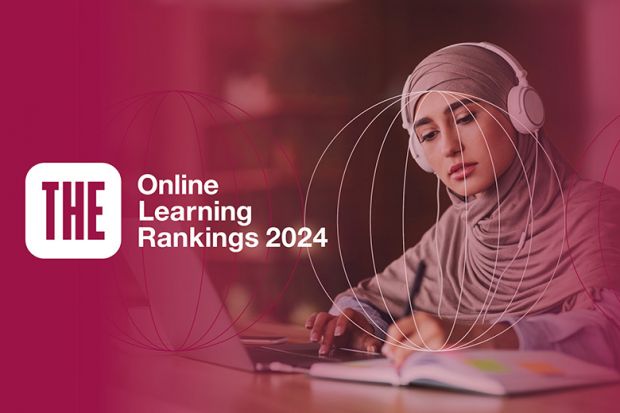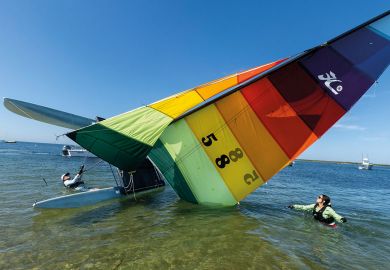What does successful online learning look like? That is the question Times Higher Education set out to answer with the new Online Learning Rankings (OLR). While online education has been a feature of the internet since its inception – let’s not forget the internet’s origin as a way to share scientific studies – the past few years have laid bare the importance of online learning, as well as the difficulties in implementing it.
Online courses enabled students to continue studying through the Covid-19 pandemic, and provide access to higher education for those living in conflict areas such as Ukraine. They bring the possibility of qualifications to those living in education deserts, and of professional development to lifelong learners. But the quality of that education is not uniform, and as the importance of online provision becomes ever more obvious, there is no global standard on how to measure the teaching quality of higher education delivered online. The THE Online Learning Rankings 2024 is the first attempt to measure online learning on a global basis.
There is also no global agreement on the definition of online learning. This pilot ranking measures only the parts of universities that deliver online learning, which means the courses are advertised as “online” and at least 40 per cent of the content is delivered online.
In putting together the inaugural OLR, THE’s data team found stark differences in the types of provision: from traditional campus universities adding online elements, to fully online operations such as open universities, to new institutions trying to provide higher education to people living in rural areas of low-income countries. Universities have different reasons for, and aims of, online learning and this makes it hard to provide precise ranks. Therefore, THE has grouped institutions into three categories: gold, silver and bronze.
In the gold category are 11 universities: three from the US, two from the UK, two from India, and one each from Russia, Hungary, New Zealand and Australia. Fourteen universities are in the silver category and 31 in bronze. A further 64 are given reporter status as they submitted data but did not meet the full entry requirements.
Online Learning Rankings 2024: gold-awarded universities
Institutions are listed alphabetically.
| Institution | Country | Resources score | Engagement score | Outcomes score | Environment score |
| American University | United States | 69.5 | 72.3 | 53.3 | 72.1 |
| Arizona State University (Tempe) | United States | 56.2 | 67.5 | 49.4 | 72.2 |
| HSE University | Russia | 62.5 | 79.2 | 61.2 | 57.2 |
| Manav Rachna International Institute of Research and Studies | India | 65.4 | 62.8 | 64.1 | 70.9 |
| Massey University | New Zealand | 45.5 | 92.6 | 27.3 | 81.4 |
| O.P. Jindal Global University | India | 72.3 | 58.2 | 79.2 | 78.0 |
| University of Central Florida | United States | 86.5 | 56.9 | 71.5 | 71.1 |
| University of Essex | UK | 56.7 | 76.8 | 69.2 | 41.5 |
| University of Liverpool | UK | 72.3 | 52.8 | 77.6 | 57.8 |
| University of South Australia | Australia | 73.5 | 45.1 | 50.1 | 63.3 |
| University of Szeged | Hungary | 72.7 | 54.3 | 44.2 | 67.9 |
In this pilot edition, THE used 17 metrics grouped into four pillars: resources, which measures the staff and resources devoted to online learning; engagement, which has six metrics, including student survey responses to compare the level of student engagement; outcomes, which measures student progression and whether they would recommend it to others; and environment, which tracks inclusion, diversity and support levels.
The US’ University of Central Florida (gold) is top globally for resources, while New Zealand’s Massey University (gold) achieves the highest scores for both engagement and environment. Ukraine’s Sumy State University is awarded silver but gains the highest score globally for outcomes. Among those awarded gold, India’s O.P. Jindal Global University achieves the best outcomes score.
In contrast to the research-focused THE World University Rankings, no university achieves high scores in all of the pillars in the OLR, reflecting the varying aims of online education providers and perhaps also the burgeoning nature of online learning. The most consistent performer in the gold category is India's Manav Rachna International Institute of Research and Studies; it is the only university to score above 60 out of 100 in all four pillars.
Campus resource collection: The business of online education
While the results and the underlying data provide interesting insights, they also contribute to an important global conversation about how best to assess and understand online learning – a large and growing part of the global higher education sector that is still not properly understood or regulated. THE’s data team is planning to launch a consultation process on the OLR in early 2025 to improve the approach and methodology for future years.
Curtis Bonk, an education and technology expert at Indiana University, a reporter institution in the ranking, said that success in online higher education differs depending on the aim of the online provision.
“We must ask, success for who and success in terms of what criteria? Success is not simply measured by retention and completion rates, comparison test scores, and satisfaction surveys any more,” he said. “From a learner’s perspective who previously lacked access to many educational opportunities because he or she is in the Global South or an education desert, success occurs every time you power up your computer and are able to access online contents and learn.”
Arizona State University (ASU) is one of the institutions in the gold category and is renowned for its digital leadership; it scores particularly highly in the environment and engagement pillars in the OLR. Phil Regier, ASU’s dean for educational initiatives, told THE that “everything we do at ASU concerning online learning is through the lens of ensuring access”.
“Let’s say, for example, we have a student who doesn’t qualify for admission into the university. We don’t turn them away. We work directly with students to identify the courses they need and offer them online, allowing students to pay for credits only after completing the course and being satisfied with their grades,” he said.
While the aims of online learning provision can vary by institution, universities delivering these courses face many of the same challenges. According to Dr Regier these range “from ensuring equitable access, to maintaining high engagement and academic rigor. A diverse, global student body means navigating differences in technology access, time zones, and language proficiency, all of which can impact a learner’s ability to fully participate.”
One of the biggest hurdles, Regier said, is ensuring that online learners feel part of the university community. This requires “innovative engagement strategies that go beyond classroom participation to foster a strong sense of belonging within the broader university community”.
Linda Harasim, a professor emerita at Simon Fraser University, has written several books on learning theory and online technology. “In my 40 years of research and teaching online higher education, I have found that community building is essential in the online classroom,” she said. “Peer collaboration and community represent some of the greatest opportunities for effective learning and augmentation of human intelligence. Humans are genetically programmed to learn best from one another.”
However, she added that “teachers face significant challenges in this area. The field has provided little training on the processes involved in creating online learning communities. This lack of support is a significant obstacle to effective online education for both teachers and learners.”
Professor Bonk agreed that creating a community was vital and warned that “any attempts to design online communities in an eight week or 16-week course can be extremely time consuming and difficult”.
“Communities typically don’t just suddenly emerge; they require lots of care and attention. For communities to form, instructors need skills in how to moderate online discussion as well as how to foster engagement among online learners. They also have to help build identity and a shared history,” he said.
For Professor Harasim, teaching online higher education requires different skills to teaching in-person, and universities fail if they do not facilitate lecturers to gain those extra credentials.
Meanwhile, technological developments, while also bringing new opportunities, create additional challenges. None more so than artificial intelligence. Professor Harasim is wary of the direction it is headed.
“Today’s educational AI software is for-profit, based on a business model with limited educational input on the design of the pedagogy or technology. The values in the technology are profit, not necessarily public interest,” she said. “Educational AI is an immense challenge for educational institutions, in that it represents a fundamental shift in control of the institutional mission, values, process and community-focused model.”
Whether AI is a help or a hindrance, it is clear that the importance of online higher education is only going to grow, and universities will need to rise to the challenge.
Online Learning Rankings 2024: results
Institutions are listed alphabetically within each tier.
We welcome your feedback: if you would like to share your insights and ideas on measuring excellence in online learning, or if you are interested in participating in future years, email onlinelearningrankings@timeshighereducation.com.
Register to continue
Why register?
- Registration is free and only takes a moment
- Once registered, you can read 3 articles a month
- Sign up for our newsletter
Subscribe
Or subscribe for unlimited access to:
- Unlimited access to news, views, insights & reviews
- Digital editions
- Digital access to THE’s university and college rankings analysis
Already registered or a current subscriber?




